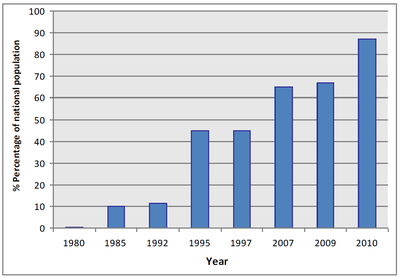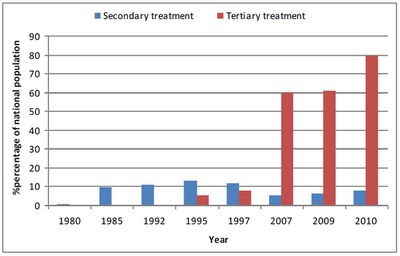Main themes and sectors addressed in the national State of Environment report
The national state of the environment report (SoER) for the period 2008-2011 was published in 2014 by the National Centre for Sustainable Development (NCSD)[1]. The previous SoER was published in July 2009. The SoER addresses the following main areas:
- air quality,
- water resources management,
- nature and biodiversity,
- urban environment,
- transport sector,
- environment and economy, and
- environmental legislation.
Key findings of the State of Environment report
Air quality
The study showed that in 2009 there was a 7.3% decrease in the total sum of emissions from acidifying substances (SO2, NOx, and NH3) and a 10.3% decrease in tropospheric ozone precursors (NOx, NMVOC, CO and CH4) compared with 1990. There was an increase of 51.5% in primary PM10 emissions during the same period.
The most important sectors of emissions in 2009 included industrial energy (due to combustion), transport, while agriculture had the largest contribution to NH3 emissions. Industrial construction and services, and households were estimated to be the most significant sectors for the emissions of primary PM10 and PM2.5, respectively.
Water resources
Increasing demand for water and groundwater abstraction tend to raise the water deficit in many regions. Water needs are often covered by transmission and storage projects, which greatly increase the cost of construction and operation. Human activities lead to a gradual degradation of the qualitative status of surface and groundwater resources, mainly in coastal and urban or agricultural areas on the eastern part of the mainland.
Wastewater treatment plants operate in most large and medium-sized cities and deal with municipal wastewater pollution. Figure 1 shows the increase in the percentage of the national population served by wastewater treatment plants. The rate in 1980 was 0.5%, in 2007 was 65%, and 87.32% in 2010.

Source: Special Secretariat for Water, OECD
Figure 2 shows the time evolution of the percentage of the national population served by wastewater treatment plants (secondary and tertiary treatment). Since 2007 a significant increase in tertiary treatment occurred.

Source: Special Secretariat for Water, OECD
Nature and Biodiversity
Greece is considered as a "hot spot" for biodiversity, with more than 6 200 endemic species[2][3].
There has been a downward trend in the Red List Index (RLI) for Greek bird species during the last 17 years. This indicates that the number of bird species facing extinction is increasing. This trend is mainly associated with the loss of natural habitats, their structural and functional degradation, pollution and disturbance.
Approximately half the area of Greece used for agricultural purposes has a High Nature Value (HNV). Total agricultural and forest land covers 51% of the total area, of which 18% are forests, 15% is forest land used for grazing and 18% is cultivated land.
The main causes of loss of biodiversity in Greece are related to past and current policies relating to land use, agriculture, fisheries, forest use, transport, tourism and production and consumption patterns.
Urban Environment
The agglomerations of Athens and Thessaloniki account for nearly 50% of the country's population. There has been an increase in traffic in Thessaloniki and there is an urgent need for building large transport infrastructure projects.
In general, urban areas are growing, while forests and farmland are falling. There is an effort to promote more environmentally friendly ways of transport. The cities with the highest air pollution problems and traffic noise are Athens and Thessaloniki. The metropolitan area of Attica presents the biggest problem in waste management domain. It has 35 uncontrolled waste disposal sites. The air pollution and the lack of ventilation in Athens enhance the urban heat island effect, which increases during the summer.
Environment and tourism
The tourism industry has experienced increased growth. However, while the number of arrivals of foreign tourists presents a long-term upward trend, income from tourism has been falling as a result of the growth in mass tourism. Such tourism has also a significant impact on the environment thereby undermining long-term development.
The most sensitive areas are the coastal areas. The most visible effects of environmental degradation are the coastal roads leading to tourist destinations, and overcrowding on beaches. The excessive consumption of water during the drought period represents a pressure on water resources, particularly in the islands. Οverpumping due to the high demand for water has multiple impacts in these areas, such as irreversible salinization of groundwater aquifers. The tourism industry is also a producer of large quantities of solid waste. Local authorities in most cases have difficulties in coping effectively with this waste production.
Environment and Economy
Following a decade (1997-2007) of high rates of economic development (4% GDP annual growth rate, 3.8% annual productivity growth rate), the Greek economy was struck by the major international financial crisis in 2008. The government's fiscal deficit almost doubled from -6.3% to -13.2% of GDP, while external public debt exceeded 123% of GDP with an increasing trend (161% in 2012).
In order to confront the crisis, reactivate production processes, and provide a stimulus impulse to the internal markets, the government implemented a program of emergency measures. A new growth model for the Greek economy was deemed necessary. Government policies during the 2008-2012 period included various actions:
- Establishment of the Ministry of Environment, Energy and Climate Change (MEEC) in 2009.
- The gradual opening of the internal energy market.
- The unbundling of power production and supply from power transmission and power distribution.
- Further penetration of natural gas usage in transportation, heating, manufacturing and industrial production.
- Establishment of the greenhouse gas (GHG) emissions registry according to EU legislation.
- The implementation of the urban waste management program and a series of measures for the environmental efficiency of buildings and constructions.
- National policies fully aligned to EU policies concerning sustainability, environmental protection and green growth.
Main policy responses to key environmental challenges and concerns
Law 4014 re-determines the environmental licensing procedures for projects and activities. In order to implement this, a number of procedures were introduced, which ensured a higher quality of environmental terms, a reduction in administrative burdens, the elimination of dual licensing, the improvement in quality of environmental assessment reports and greater legal certainty.
The National Waste Management Plan (NWMP) and the National Waste Prevention Programme are currently under preparation. Specific measures include promoting waste recovery and recycling. Regional waste management plans, covering the geographical territory of each region, will be updated incorporating the principles, directions and measures of the NWMP.
For water priority has been given to the development and public consultation of River Basin Management Plans (RBMP). Greece has established a national monitoring programme for the assessment of the status of surface water and ground water. The programme monitors biological, general physicochemical, and specific chemical parameters, as well as priority pollutants. The monitoring network includes more than 2000 monitoring points and it has been in operation since 2012.
Since 2010, the Ministry assesses bathing waters in accordance with Directive 2006/7/EC, demonstrating a high level of compliance: over 98% had "excellent and good quality" and close to 100% had "at least sufficient quality" out of 2162 bathing waters monitored in 2013.
The main pillars of national energy planning are to reduce dependence on imported energy, maximize the penetration of renewables, achieve a significant reduction of GHG emissions by 2050 and reinforce consumer protection. In 2012 the share of renewable sources in the energy market was 15.1% (source Eurostat) compared to 7.1% in 2004.
Country specific issues
Key environmental issues with growing importance for the country are the following:
- Adaptation to the impacts of climate change. Climate change represents an emerging environmental problem. The MEEC is working towards the development of a national strategy. Actions to address climate change must involve a change in the current growth model towards a sustainable, green economy and low or zero carbon emissions with the use of modern technology.
- Management and protection of the natural environment in conditions of economic crisis. Greece hosts a high diversity of species and ecosystems. Their protection represents a high priority for the Ministry.
- Management of the marine and coastal environment, making use of the tools of the Marine Spatial Planning, Integrated Coastal Zone Management, the policy addressing erosion and the EU Strategy for the Adriatic and Ionian Region.


Document Actions
Share with others